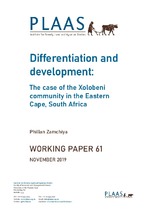| dc.identifier.citation | Zamchiya, P. 2019. “Differentiation and development: The case of the Xolobeni community in the Eastern Cape, South Africa.” Working Paper No. 61. Institute for Poverty, Land and Agrarian Studies, University of the Western Cape, Bellville, South Africa. | en_US |
| dc.description.abstract | Most agrarian scholars argue that long historic processes of colonialism, capitalist development and implementation of neo-liberal structural policies in Sub-Saharan Africa have resulted in deagrarianisation and its sub-genre of depeasantisation particularly in South Africa. I argue that this long historic process epitomised, in some cases, by abandonment of cropping fields and deactivation of agriculture was uneven between and within communities across South Africa. Glossing over the geographic and socially differentiated outcomes has partly led to the general characterisation of rural communities as relic agrarian populations that need to be modernised through a new wave of large-scale land based investments. To substantiate, I use the case study of Xolobeni, which is situated on the Wild Coast, in the Eastern Cape Province. The Xolobeni community is engaged in a struggle against the South African government and the Transworld Energy and Minerals Resources (TEM) from Australia, which wants to invest in titanium mining in the area since 2001. Following a series of struggles, in 2018 the North Gauteng High Court ruled that the community has a right to say no to a development project, in line with the international principle of Free, Prior and Informed Consent (FPIC). In addition to this legal right, I posit that the community actively used land for multiple livelihoods including gardening, livestock and crop production as well as marine resource harvesting for both consumption and for sale in contrast to the deactivation thesis. Given local processes of social differentiation, the benefits differed to a degree across a continuum of subsistence-oriented households, market-oriented households, wage and sale reliant households and wage reliant households. However, in all cases land-based livelihoods were essential in enabling households to create a higher standard of living. Consequently, the community preferred ecotourism and an agrarian model of development that would preserve their livelihoods, conserve ecological natural resources and reduce rural poverty as well as contribute to wider national economic development. | en_US |

